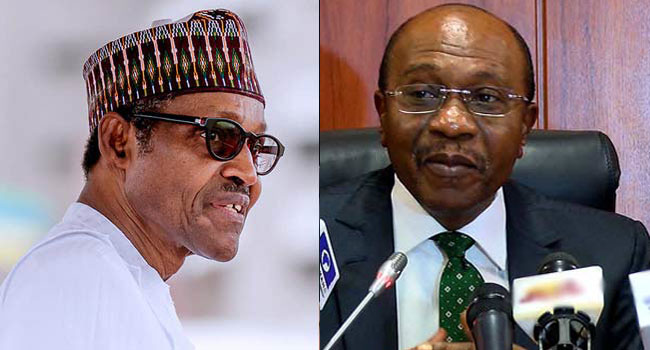•Insists subsidy removal good on paper, but has huge human consequences
•Reveals N152bn, $386m, £1.1m, €157,000, others recovered in 2021
President Muhammadu Buhari, yesterday, defended the policies being implemented by Governor of the Central Bank of Nigeria (CBN), Mr. Godwin Emefiele, saying rather than follow textbook solutions developed in the more advanced climes, which may not be suitable for Nigeria, the apex bank’s head has rightly resorted to “unorthodox” measures in trying to resolve the country’s economic challenges.
In his written responses to Bloomberg’s interview questions, Buhari said the accusations against Emefiele by detractors, including being labelled as “political”, had more to do with the methods he was deploying to try to revamp the Nigerian economy, rather than the substance of the allegations.
The president maintained that every country should have the right to choose its economic model and policies, insisting that the CBN chief is facing criticisms because he is not following traditional methods, which have failed in the past.
Buhari stated, “But there is a subtext to the accusations. Because the governor follows a model outside of the economic orthodoxy, he is labelled political. But the orthodoxy has proved wrong time and again.
“Instead, the governor is following an alternative economic model that puts people at the heart of policy. Nigeria should be free to choose its development model and how to construct our economy, so it functions for Nigerians.”
Responding to a question on the independence of the office of the CBN governor, given Emefiele’s alleged interest in the just-concluded presidential primaries of the All Progressives Congress (APC), the president said if there were infractions, the board of the apex bank was better placed to sanction the governor.
He said, “The CBN governor is appointed by the president. But this appointment is subject to confirmation by the Nigerian Senate. Ultimately, it will be for the CBN’s Board of Directors to determine whether a CBN governor’s actions have fallen foul of the laws in place to ensure he can most effectively carry out his duties.”
A critical actor in the federal government’s efforts to boost local food production, the CBN has provided loans to farmers and restricted access to foreign exchange for importers of dozens of products, actions for which it has received flaks.
But Buhari insisted that food price inflation in the country could have been worse if Emefiele had not initiated organised programmes to boost domestic production, stressing that even at that , Nigeria still does not grow enough domestically.
He pointed out that initiatives, such as the Anchor Borrower’s Programme, boosted rice production to nine million metric tonnes in 2021, from around 5.4 million metric tonnes in 2015.
“Even in the years of drought, rice production outstripped pre-2015 levels. Imports have fallen to near zero. We are making progress,” he declared.
On why he had continued to retain subsidy on petrol, the president noted that even most Western countries were currently implementing fuel subsidies.
“Why would we remove ours now? What is good for the goose is good for the gander!” he stressed.
According to him, while the removal of subsidy may look good on paper, the impact on Nigerians would be largely negative and unbearable.
“What our Western allies are learning the hard way is what looks good on paper and the human consequences are two different things,” the president maintained.
Buhari added that while his government had put in motion plans to remove fuel subsidy late last year, after further consultation with stakeholders, and as events unfolded this year, such a move became increasingly untenable.
While internal production for refined products would help mitigate the effect of subsidy removal, the president projected that capacity would increase markedly later this year and next, as private players and modular refineries come on board.
Buhari posited that he was winning the war against corruption, starting with the Whistleblowing Policy enacted in his first year in office, revealing that hundreds of millions in stolen funds have been returned within Nigeria.
He stated that the monies had now been deployed as social and welfare funds distributed directly to the poorest during the COVID-19 pandemic and the provision of long-delayed infrastructure, such as roads, bridges, rail, and power.
He explained, “As an illustration, monetary recoveries (January-December) 2021 show that more than N152 billion has been recovered. Dollar recoveries for the year amount to over $386 million; GBP more than 1.1 million; Euro, about 157,000; Saudi Riyals about 1.7 million, some more in digital and other currencies.”
In the past, Buhari had said international partners refused to return funds they held for decades to previous Nigerian administrations in the certainty they would simply be re-stolen.
“They changed their approach with us because they knew my administration could be trusted,” he said.
Buhari said that his successor would inherit a far more resilient economy, thanks to investments in infrastructure and policies that he said had bolstered local production.




